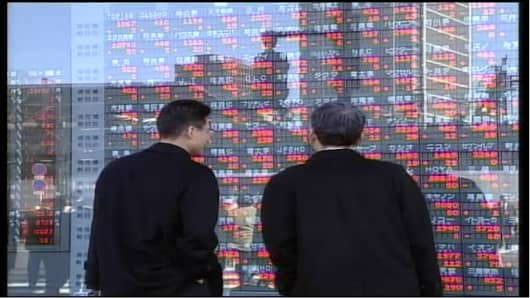Asian stocks led by finance counters, were lower across the board in the afternoon session Friday, on concerns that problems in the U.S. housing and credit markets could push the world's biggest economy into recession. Australia, Japan and South Korea all closed down.
Financial stocks led the declines, with the sector bearing the brunt of dwindling investor confidence in recent weeks as fallout from the meltdown in subprime mortgages spread to other corners of the credit market.
Three of Asia's biggest banks, including state-run giant Bank of China and Southeast Asia's biggest bank DBS Group, revealed bigger-than-expected exposure to the U.S. subprime mortgage crisis, sending their shares tumbling. The news prompted fears that Asian banks, although domestically focused and risk averse after the Asia financial crisis, were not as immune as investors had hoped from the subprime meltdown.
Tokyo's Nikkei 225 Average closed lower as investors squared their positions ahead of Japan's cabinet reshuffle and some key U.S. economic data next week, unloading Kyocera and other recent gainers. But losses were limited thanks to gains in Canon, which rose after announcing a share buyback, and a rise in Daikin Industries, which advanced after Credit Suisse upgraded it to "outperform" from "neutral".
South Korea's KOSPI pared earlier sharp losses to end 0.47% lower as exporters such as Samsung Electronics retreated on fears a U.S. housing slump will hit the world's top economy, but the main index still posted its best weekly gain in nearly five years.
Australia's S&P/ASX 200 Index finished almost 1% lower as worries that the U.S. could slip into a recession pressured U.S.-exposed firms such as CSL, while Insurance Australia Group skidded on disappointing earnings.
Singapore's Straits Times Index ended barely lower. Financial issues weighed on the market led by DBS Group, after Southeast Asia's biggest bank said that it has more direct exposure to debt obligations than previously declared. But DBS added that it is comfortable with the holding.
Hong Kong blue chips fell 0.2% after rising for four straight sessions, while Bank of China shares slumped on greater-than-expected exposure to subprime-backed assets. The lender's Hong Kong unit, BoC, also slid after brokers downgraded the stock, citing concerns about
the local lender's subprime exposure.
China's Shanghai Composite Index gained 1.5% to a fresh record high, boosted by banking stocks after two of the nation's biggest banks reported slightly better-than-expected earnings. The market was also buoyed by generally positive coverage in the official Chinese media of the index's rise above the 5,000 level for the first time on Thursday.


